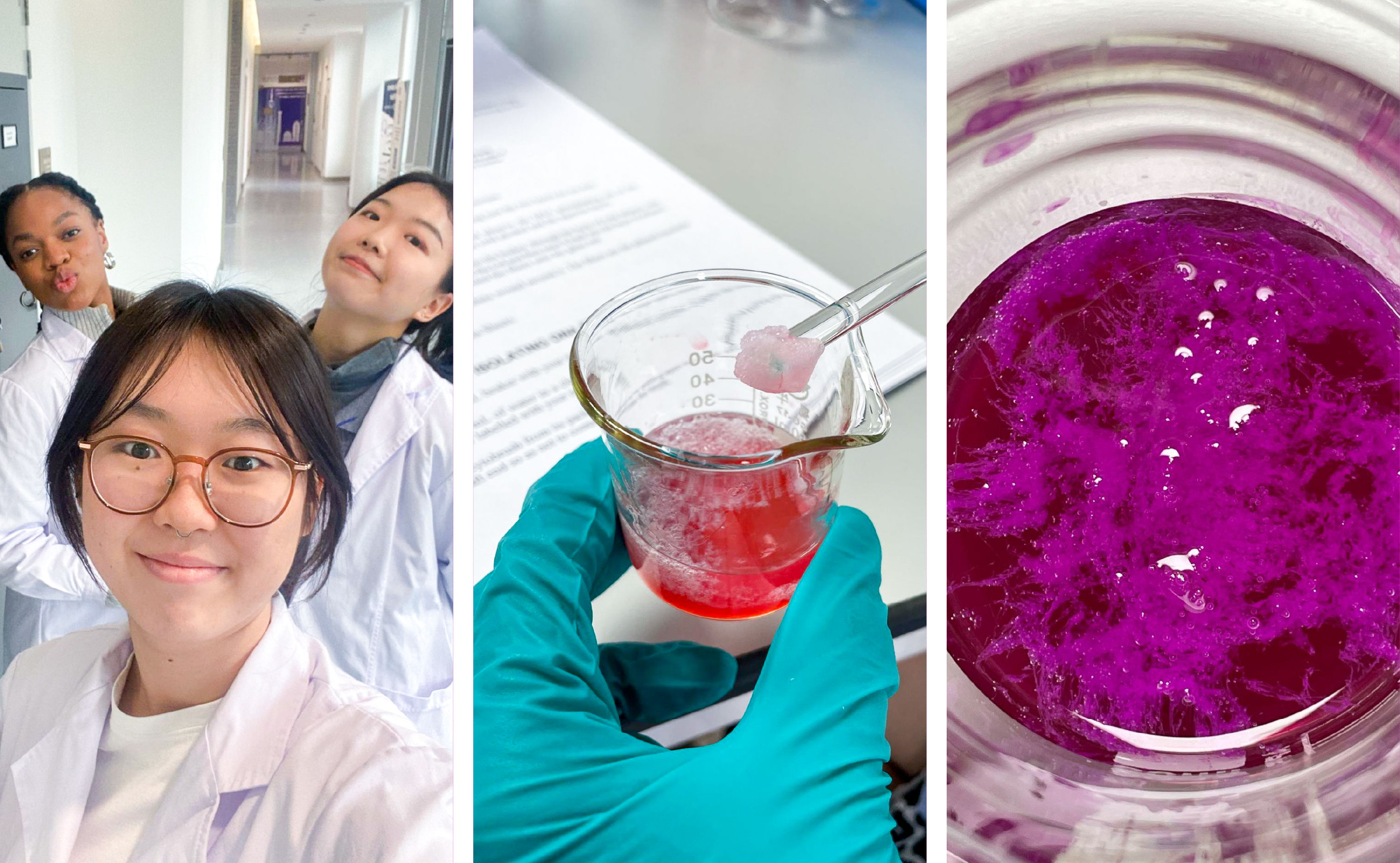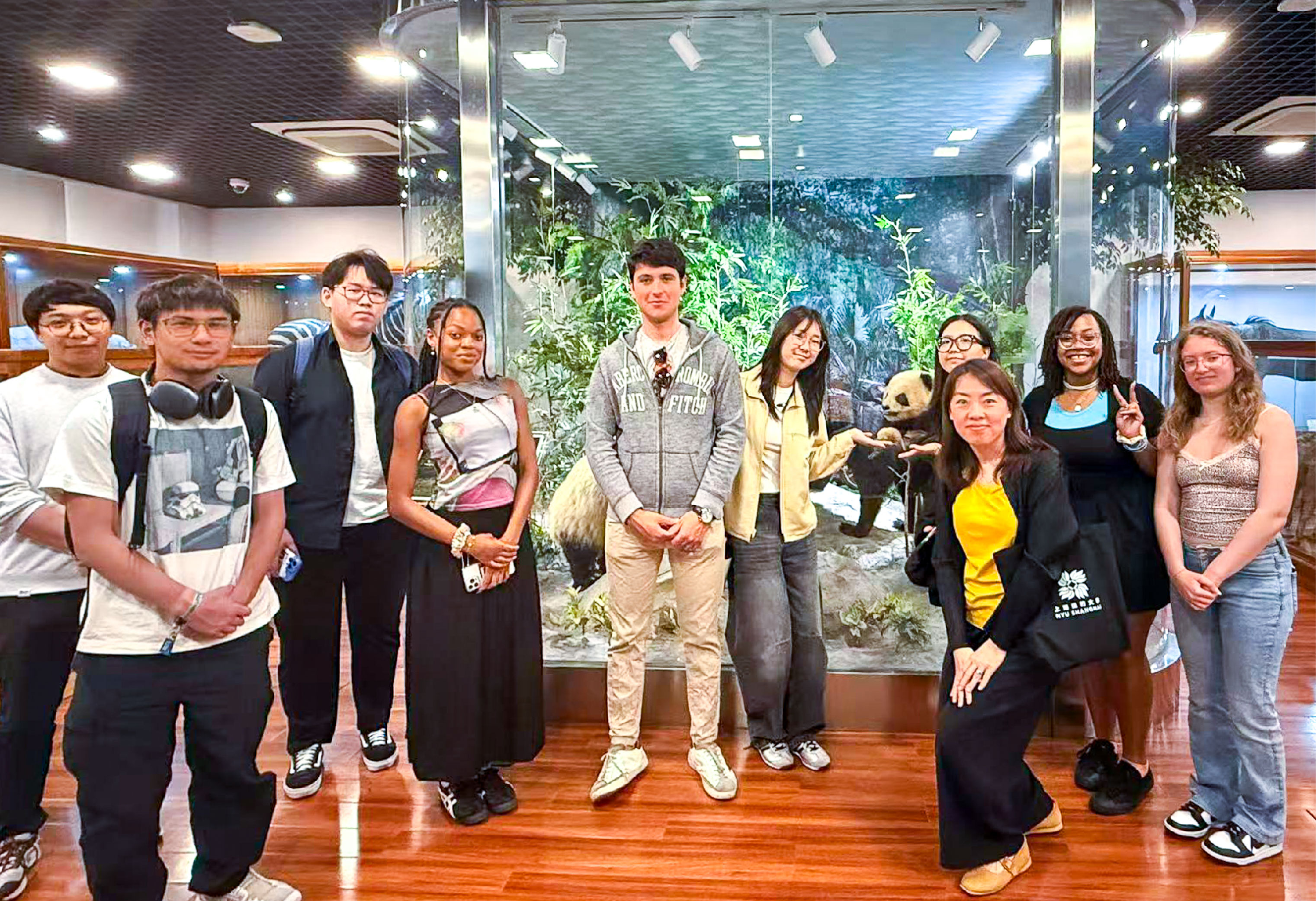
In her last semester at NYU Shanghai, Wang Wuyou ’25, who studied Social Science with a concentration in Anthropology, found herself donning a white lab coat and extracting DNA from strawberries and dragonfruit. The lab session was part of Human Genetics: Genes in Human Health & Disease, a course designed to bring lab research alive for non-natural science major students.
At first Wuyou had hesitations, but she soon gained confidence in the lab. “Even as a humanities student, when you’re pushed to take a science course you realize you can learn it,” she says. “Because NYU Shanghai lets us explore and fail, you slowly overcome the fear factor.”
At NYU Shanghai, where students are encouraged to explore beyond borders, courses are specially designed for students who might otherwise be intimidated by the natural sciences.
Being forced to step out of her comfort zone had a knock-on effect—Wuyou developed intellectual curiosity beyond her own field. In a class presentation on autism, she linked genetic findings to the sociological concept of biopolitics—how biological characteristics intersect with political rights—and wrote a report her professor called “refreshingly original.” The assignment, she says, helped her find interdisciplinary connections with her studies in social science.

Professor of Practice in Biology Dr. Yu Danyang, who developed the Human Genetics course and has taught it since 2023, says the combination of courses helps students connect theory and real-world examples. General education and major courses can inspire each other, creating a kind of ‘chemical reaction’ in the students,” she says.
The course was selected as a Shanghai municipal key course in 2024 and is classified as an Experimental Discovery (ED) course—part of the core curriculum. All undergraduates who are not majoring in the natural sciences must take at least one ED course to graduate.
Yu says her goal isn't to train geneticists but rather to present students enough genetic knowledge to understand how scientists test hypotheses and solve problems, to learn to observe the world from a scientific perspective, and to develop a sense of awe for living systems.
She designed the course to include 14 weeks of lectures, eight lab sessions and two field trips. Students are assessed on more than just exams. They are asked to explain a scientific phenomenon, evaluate a discovery, or predict a science-related business decision. She asks her students how they might approach gene-edited crops as a policymaker or how they would evaluate a vaccine’s commercial potential as an investor.
Yu frames classroom discussion around concrete, inspiring questions that connect hard science to everyday life. She and her students discuss why some genetic mutations cause cancer while others are harmless or how genes might be modified to treat rare genetic diseases. They debate the ethical issues of using DNA tests to decide biological relationships or how a body fluid sample can be used to crack a cold case. These are the kinds of questions that bring genetics from the textbook into reality for students.

Another course offered to non-natural science majors is How Things Work, taught by Associate Professor of Physics Dr. Qi Bing. The course explains physics in an approachable way, leading students through nine experiments and related concepts in a single semester—from classical mechanics to optics to elementary quantum physics.
Qi describes his mission as demystifying physics: to teach a way of thinking more than to solve particular physics problems. He asks students to begin with basics—how do we describe an object’s position in three-dimensional space?—and builds understanding from their everyday experiences.
Qi also sees an advantage in humanities-trained students: “They often think from intuition. Physics is rational, but intuition is important; in some cases, thinking outside of the box brings fresh insight.” Teaching non-specialists has also pushed Qi to reframe his own research in quantum communication and quantum information. Faced with students from finance or the arts who recoil at the sight of words like quantum computing, he must answer plainly, “Why should this matter to anyone outside my field?”
For non-natural science majors, the courses have transformed challenging subjects into something approachable. They even have reshaped their ways of learning and thinking.
Diego Fischetti ’25, a Business and Finance major from Sardinia, Italy, enrolled in Human Genetics to fulfill a science requirement; instead, he had an experience that profoundly reshaped the way he understood his own body. The course transformed genetics from an abstract topic into something immediately relevant, he says. “Before, I thought genetics was something distant,” he says. “Now I see DNA as a set of instructions that supports everything. And I finally understand how those instructions translate into complex biological functions.”
Interactive Media Arts major Zeng Hao ’25 assumed a general-education science class would be like high-school biology—dry theory and probability drills—but she found the genetics labs and discussions interesting. Now she seeks out biology-themed art in museums, forwards biotech news articles to classmates, and is already sketching ideas for future bio-art projects.
There were some unexpected results of taking a natural science course. Putting on a lab coat and following step-by-step experiments provided a welcome respite from the pressure of her senior capstone design project, she says. Surprisingly, extracting DNA from fruit and watching real phenomena unfold helped her relax.
Wuyou, the social science major who took Professor Yu’s Genetics class in the spring, says it changed how she sees the world. Looking ahead, she says this broadened perspective has made her bolder about venturing into other unfamiliar territory—she plans to pursue a master’s in film studies at NYU in New York.
It’s those unexpected transformational experiences that NYU Shanghai hopes will help their students grow throughout their four years of university. Liberal arts education and professional training go hand in hand at NYU Shanghai, where core modules in society and culture, writing, mathematics, science, computational thinking and languages together provide students with foundational knowledge and intellectual tools that will equip them for success beyond graduation.

